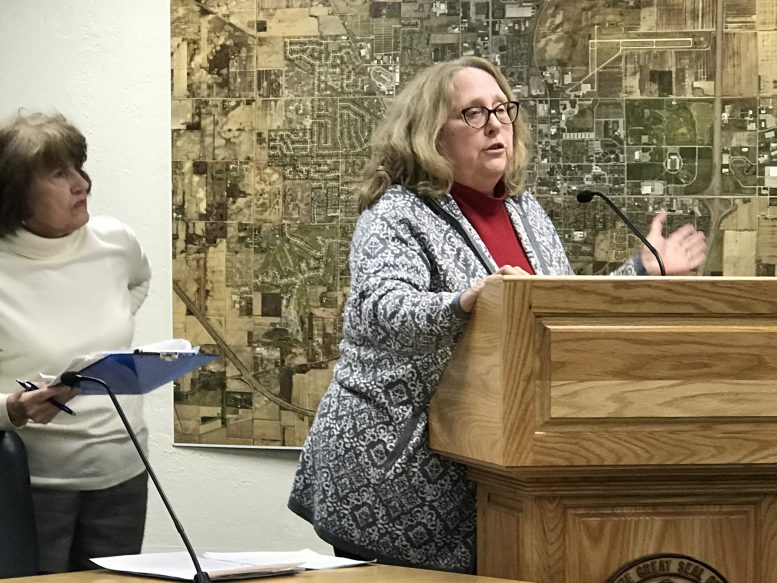By BG INDEPENDENT NEWS
Bowling Green City Council is trying to build a rental housing regulation program that targets bad landlords without burdening good ones.
So far, that has entailed hearing from renters, neighbors and student legal services representatives about the poor conditions of some rental housing in Bowling Green.
In order to get the full picture, council member John Zanfardino announced during Tuesday’s City Council meeting that surveys are being created to assess both sides of the sensitive issue. One survey will be sent to property owners, and another will be sent to tenants.
Zanfardino also announced that a panel discussion with property owners from the local landlord association will be held March 10, from 5 to 6:30 p.m., in council chambers.
Zanfardino chairs council’s Community Improvement Committee on the rental housing issue. That committee met before Tuesday’s council meeting, but its business spilled over into the lobby visitation section of the regular meeting.
The committee heard from representatives of the East Side Neighborhood Group who reported on their efforts to study 59 cities in Ohio as well as Adrian, Michigan that had either rental unit registration and/or inspection regulations. Of those, 59 had registration, usually annually, said Elizabeth Burroughs.
Inspections varied in terms of what was inspected. Some would inspect the exterior only, while some would check the interior.
The majority, though, would look at both inside and outside. They also looked at what triggered an inspection. Some were routine while others were done only if there was a complaint or when there was a change of tenant or owner.
The fee for registration varied widely, Burroughs reported they ranged from free to $600 in Beachwood. The cost of inspection varied with some being with registration.
Rose Hess said despite concerns expressed by some BG landlords, the cost of inspections was “not astronomical,” certainly not in hundreds or thousands dollars. Instead $50 annually was a more likely cost.
“This is where there was a large number,” Hess said. “Many cities charge just $60 for registration and don’t even have an inspection fee.”
Even the more expensive such as Athens at $185 a year, Hess said, are “not horrendous.”
“That was an eye opener for us,” Hess said.
Hess also addressed the contention that inspections are illegal. She said her review of case law found that inspections are illegal “without provision for an administrative search warrant.”
Regulations written to include an administrative search warrant should hold up in court, she said.

The committee also heard a presentation by Harley Maddox, the director of the Salvation Army of Wood County, on the problems of homelessness.
Maddox said it is difficult for poor people to find affordable housing within the county, and when they do the units are often in very poor condition.
Leaky and poorly insulated homes, especially trailers, mean poor tenants can face utility bills of $600 a month, even though they aren’t home during the day.
She spoke of one family whose only source of power was an extension cord extended from a neighboring unit.
Aidan Hubbell-Staeble said that the lack of quality affordable housing is driving young professionals out of Bowling Green.
He has contacted a number of his peers, many of whom ended up living in Maumee and Perrysburg, about their experiences with renting in Bowling Green. Some even moved out of the area to Cleveland and Columbus.
When Hubbell-Staeble and his fiancee were looking for a place, they found houses with windows painted shut, holes in the wall, and a single entrance for the unit. They were “able to find a pretty good quality house” eventually.
Based on the stories shared with him, Hubbell-Staeble talked about landlords taking security deposits even though the problem was evident and documented before the tenants moved in. Another landlord claimed to have paid a utility bill but had no documentation about how much was owed.
One house had a colony of bats in the attic. The most the landlord did was have his handyman caulk around the bathroom vents.
The tenant had a cat, and he was concerned about rabies.
“Essentially we’re losing our young professionals to neighboring communities,” he said. “Bowling Green is missing out, not just on tax dollars but really engaged residents who should be living here.”
During council meeting that followed, former council member Daniel Gordon asked council to not squander the opportunity to implement change.
“I think these are protections that are very much needed for the citizens of Bowling Green,” Gordon said.
Debate has been going on for too long, with no action, he said.
“We’ve been having this discussion for longer than I’ve been alive,” Gordon, 30, said.
But now there seems to be some momentum to put a rental housing registration or inspection program in place.
“Please don’t let it go to waste,” he said.
Margaret Montague, of the Welcome BG steering committee, also urged council to formalize the process of holding landlords accountable for their properties. Renters from other countries are very vulnerable, she said.
Adopting a rental housing program would be a positive step in creating a more welcoming, safe and equitable community, Montague said.
Nate Eberly, however, asked City Council to not be so hasty. Eberly said he has rented homes in three different wards in Bowling Green – and while they weren’t in the best condition, they were not close to being “blight.”
“There are problem properties,” he said. But the city should work on those properties — not penalize all landlords, Eberly said.
The next meeting of council’s Community Improvement Committee on the rental housing issue will be held Feb. 27, at 5 p.m., in council chambers.

